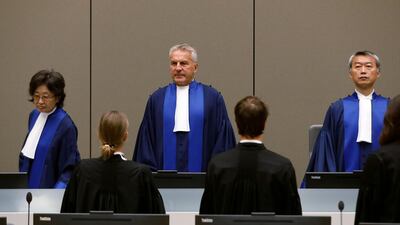In times of conflict, philosophers have said, the winners are heroes while the losers are war criminals.
Contentious as the assertion may be, it is reflected in the bitter controversy surrounding the International Criminal Court amid threats from President Donald Trump’s national security adviser John Bolton to impose sanctions and even prosecute its officials.
For the hawkishly belligerent Mr Bolton, the subtle refinement may be that when the United States defends its own security needs, it does not feel answerable to an “illegitimate court”.
For participants in warfare, national interest invariably comes first. Even after events as appalling as the Nazis’ extermination of Jews, the Rwandan genocide and mass slaughter committed in the former Yugoslavia and Syria, some have offered justification or simple denial.
Rarely can this have been more dramatically demonstrated than by the suicide, filmed on live television, of Slobodan Praljak, a Bosnian Croat general convicted of crimes against humanity during the Croat-Bosnia war by the International Criminal Tribunal for the Former Yugoslavia, an ad hoc United Nations body that preceded the ICC.
When Praljak’s conviction and 20-year jail sentence were upheld in November last year, he announced in court that he rejected the verdict and swallowed poison, dying a war criminal in the eyes of much of the world but a hero to supporters.
The ICC was formally established in 2002, nine years after the establishment of the Yugoslavia tribunal. But many diplomatic roads led to Rome, where the UN treaty creating the institution was agreed in 1998.
As long ago as 1872, a Swiss jurist, Gustave Moynier, outraged by atrocities in the Franco-Prussian war, called for an international court of arbitration to punish violations of slowly developing norms on the limits of legitimate combat.
There was no rush to adopt his proposal, with most countries suspicious of any interference with state sovereignty.
At the Versailles peace conference following the First World War, an international tribunal to judge political figures accused of international crimes was again mooted. Nothing came of the idea, even after a 1937 Geneva conference agreed on prosecuting acts of international terrorism.
With the Nuremberg and Tokyo trials of German and Japanese war criminals after the Second World War, the UN finally identified the need for a formal international court. But the Cold War intervened, stalling progress until 1989, when Trinidad and Tobago resurrected the idea of a global criminal jurisdiction, though in the context of drug trafficking.
When, nine years later, the Rome summit created the ICC, seven countries voted against: China, Israel, Iraq, Libya, Qatar, Yemen and the United States. The US rejection harked back to 19th century concerns about interference in national sovereignty; Israel objected to the transfer of people into occupied territory being listed as a war crime.
_______________
Read more:
Palestinians file ICC war crimes complaint over Israeli demolition plans
US threatens to arrest ICC judges who probe Afghan war crimes
_______________
Despite low enthusiasm on the part of a few key nations, the ICC is credited with notable achievements.
Its prosecutors have mounted investigations over alleged crimes committed in Burundi, the Central African Republic, the Ivory Coast, Sudan, the Democratic Republic of the Congo, Kenya, Libya, Mali and Uganda. Among preliminary investigations under way, the inquiry into US actions in Afghanistan was the trigger for Mr Bolton’s intervention.
The first person to stand trial at the ICC was a Congolese rebel leader, Thomas Lubanga Dyilo, whose followers were accused of mass murder, torture and rape during the Ituri conflict between 1999 and 2007. He was convicted in 2012 of the forced enlistment of child soldiers and jailed for 14 years.
Among its failures, the ICC failed to sustain a landmark conviction for war crimes including, for the first time, sexual violence, against another former Congolese rebel leader, Jean-Pierre Bemba. His conviction and 18-year sentence were overturned on appeal and he is back in the Congo running for the presidency.
Mr Bolton’s denunciation of the ICC merely replaces the measured diplomacy of President Bill Clinton – who talked of “our fundamental concerns” – with the fierce rhetoric preferred by Mr Trump.
Only Barack Obama, among US presidents, has viewed the ICC with cautious approval, judging it on a case by case basis. Even then, the treaty – though signed under the Clinton administration in 2000 - was not ratified by Washington.
Despite US hostility, the court has been attacked as a tool of western imperialism.
A Zimbabwean radio commentator, William Muchayi, said in 2013 that attempts to prosecute Kenyan leaders, later dropped, handed ammunition to critics who alleged bias against Africans.
"Since its birth in 2002, all cases so far launched have been against Africans, with notable figures on the list including Omar Al Bashir [Sudan], Jean-Pierre Bemba [DRC], Joseph Kony [Uganda] , Muammar Gaddafi [Libya], Laurent Gbagbo [Ivory Coast] and many others,” he said. “Rather than being viewed as an instrument to fight impunity and human rights abuses globally, critics of the court are quick to label it as a colonialist tool."
Yet a highly respected Kenyan judge, Joyce Aluoch, this year completed a nine-year appointment to the ICC bench. Life’s challenges, she said recently, had taught her that “when you reach for higher, the possibilities become unlimited”.
None of this will sway Mr Bolton as he treats the ICC with the contempt he once showed when suggesting it would not matter if the UN’s New York headquarters lost 10 of its 38 storeys.
Branding the court a potential threat to US security interests, he said the Rome treaty allowed responsibility for war crimes to be taken “all the way up the chain of command – the sort of investigation some people who live in Fairyland might like to undertake but which bears no relationship at all to conditions in the real world.”


